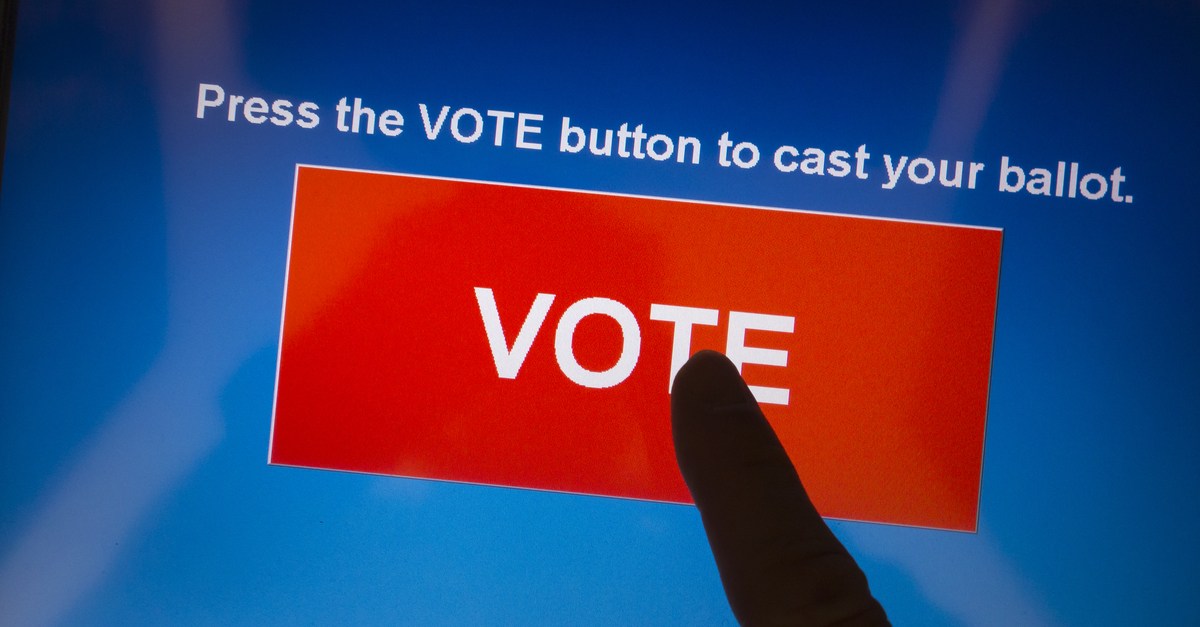“It is not letting me vote for who I want to vote for,” a Mississippi voter said in a video that shows him repeatedly pushing a button on an electronic touch-screen voting machine that keeps switching his vote to another candidate.
On Tuesday morning, the date of Mississippi’s Republican primary election for governor, the video was posted to Twitter…
https://twitter.com/STaylorRayburn/status/1166347828152680449…and to Facebook by user Sally Kate Walker, who wrote this as a caption:
Ummmm … seems legit, Mississippi.
Walker said in a comment that the incident happened in Oxford, Miss., in Lafayette County. A local paper, the Clarion Ledger, reported that as of Tuesday night, there were at least three reports confirmed by state elections officials of voting machines in two counties changing voters’ selections in the state’s GOP governor primary runoff.
The machines were switching voters’ selections from Bill Waller Jr.- a former Supreme Court Chief justice – to Lt. Gov. Tate Reeves. Waller’s campaign told the Clarion Ledger it also received reports of misbehaving voter machines in at least seven other counties.
Waller conceded to Reeves around 9 p.m. on Tuesday night. With Reeves leading 54% to Waller’s 46%, it looks unlikely that the glitches affected the outcome.
Before the malfunctioning machine was discovered in Lafayette County, the machine – reportedly a paperless AccuVote TSX from Diebold – only recorded 19 votes, according to Anna Moak, a spokeswoman for the Secretary of State’s Office. A technician was dispatched, and the machine is being replaced, she said.
Moak said that the machines are “county-owned and tested by local officials” and “to our knowledge, only one machine was malfunctioning.” State elections officials later confirmed that at least three machines in two counties had been switching votes.
The incident underscores concerns of election security advocates who’ve long warned that electronic voting systems – particularly the types in use in Mississippi, which fail to generate a verified paper backup – are a security risk because neither election officials nor the public are able to audit the results.
Lawrence Norden, co-author of a September 2015 report for the Brennan Center for Justice titled “America’s Voting Machines at Risk,” wrote in a 2017 blog post that 14 states, “including some jurisdictions in Georgia, Pennsylvania, Virginia, and Texas – still use paperless electronic voting machines.”
Those systems should be replaced “as soon as possible,” he said, and the best way to do that is decidedly low-tech:
The most important technology for enhancing security has been around for millennia: paper. Specifically, every new voting machine in the United States should have a paper record that the voter reviews, and that can be used later to check the electronic totals that are reported.
This could be a paper ballot the voter fills out before it is scanned by a machine, or a record created by the machine on which the voter makes her selections – so long as she can review that record and make changes before casting her vote.
Earlier this month, Norden, along with Andrea Córdova and Liz Howard, posted an update to the Brennan Center for Justice, regarding where we stand six months before the New Hampshire primary.
Last year, in spite of Congress providing $380 million to states to help with voting technology upgrades, it wasn’t enough, they said.
Experts agree that, due to security and reliability, systems over a decade old need to be replaced. But by the Brennan Center’s estimate, as of November 2018, 34% of all local election jurisdictions in the US were using voting machines that were at least 10 years old: a number that includes counties and towns in 41 states.
Progress is being made: nearly half of states with paperless voting machines in 2016 will have replaced those machines by the 2020 elections. However, that still leaves as many as 16 million voters who’ll be casting votes on paperless, non-auditable systems in the 2020 election.
More from this week: the federal government, fearing state-sponsored ransomware attacks, is reportedly looking to boost protection for voter registration databases and systems ahead of the 2020 election.
On Monday, Reuters reported that the government plans to launch a program in about a month that will protect those databases and systems, which are used to validate the eligibility of voters.
Current and former officials told Reuters that such systems are deemed high risk, given that they’re one of the few pieces of technology that regularly connects to the internet.

epic_null
They are very lucky this came with visual artifacts. It would be relatively easy to change the vote in the background.
Epic_Null
Looking at the video, I am wondering if they could have voted for what they wanted by moving their hand down a bit. It wouldn’t be the first time where the click was strangely offset. (It’s annoying when it happens, but on next load it’s usually back to normal)
Sam Spade
I’m betting that would have worked. It looks to me like the touch input needed recalibrating.
Sb1815
“one of the few peoces of technology that regularly connect to the internet”?
Not sure about your side of the lake, but on my side of the atlantic, most all our stuff is regularly connected to the internet.
If we wanted real security in voting, we wouldn’t connect the machines to the internet at all.
The real question is why did the machines get designed this way and will new machines fix the problem or ignore the main security issues.
Mahhn
“misbehaving voter machines” uhhh sure. Machines can only do what they are made to. Russians, Goog, FB, and who ever configured those machines – I’ve put you on Santa’s naughty list for election meddling – and I’m asking Futurama Santa to service you.
TornButWhole
It will be the touch screen being out of sync.